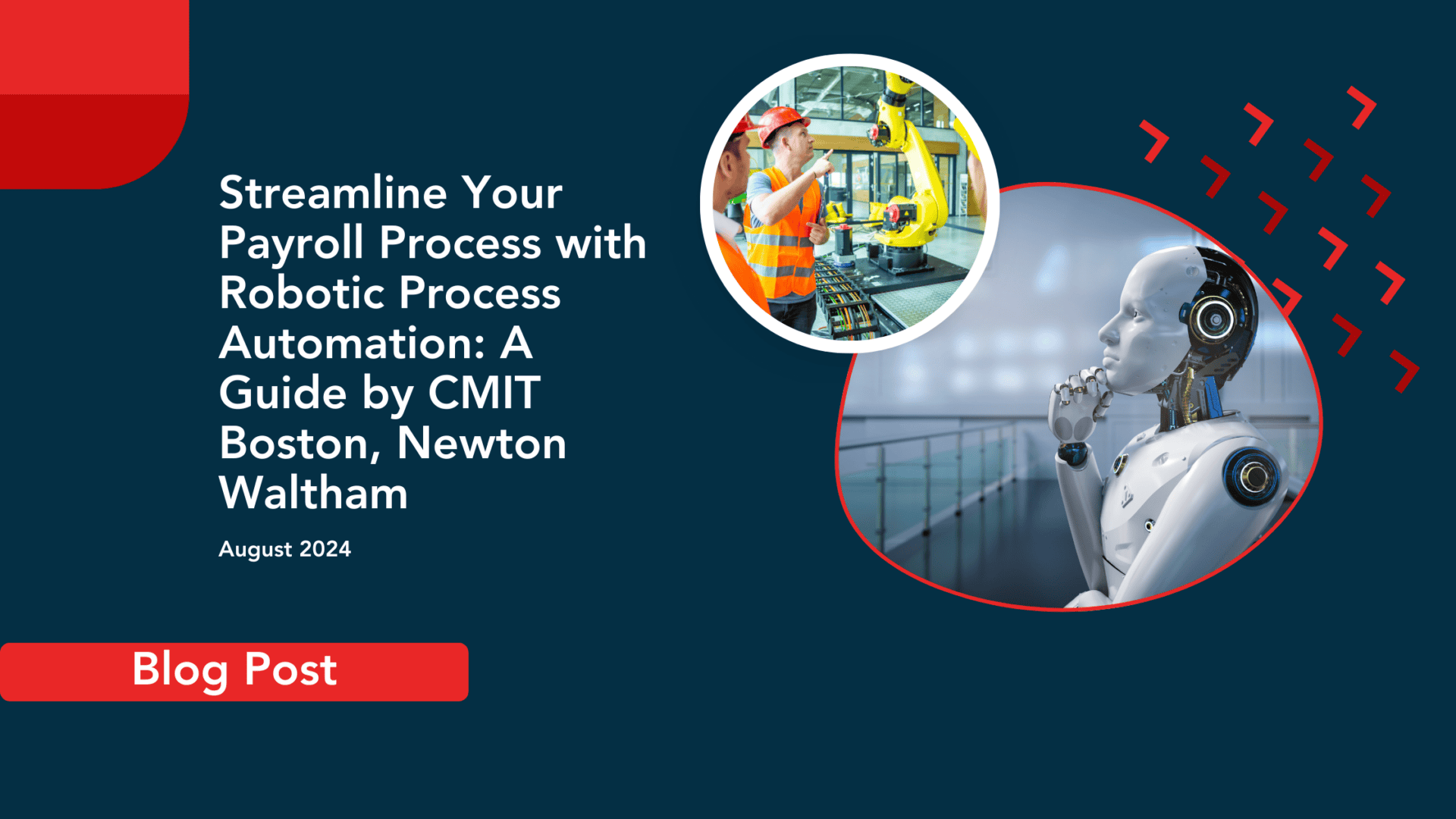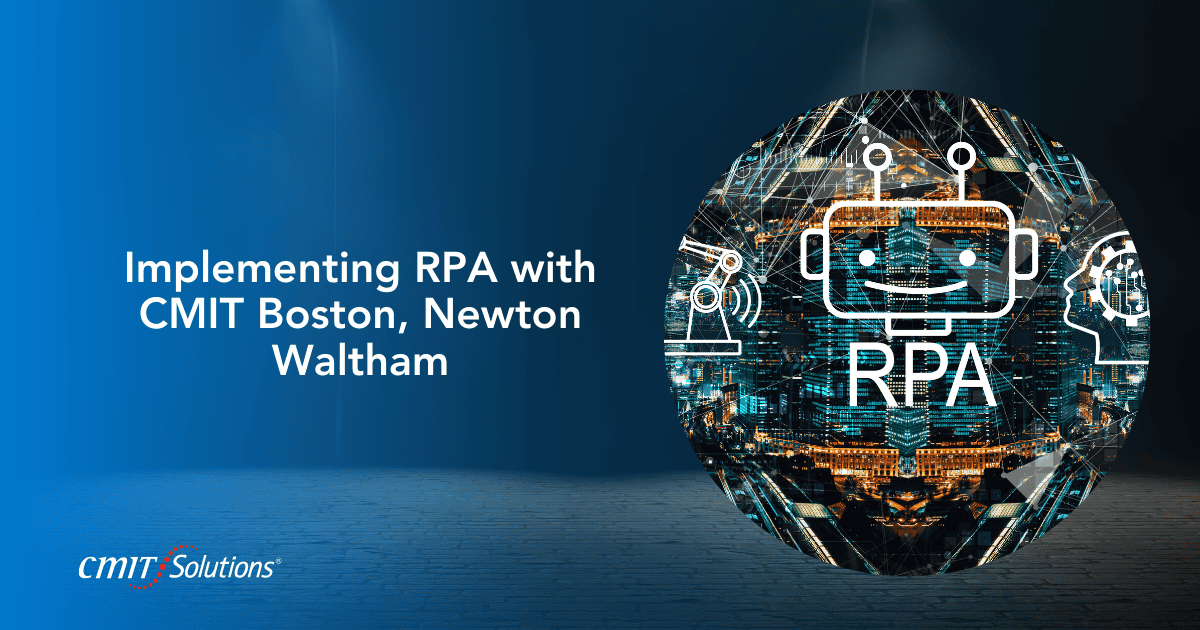Robotic Process Automation (RPA) is a game-changer for payroll management. By leveraging RPA, businesses can automate mundane tasks, reduce errors, and enhance efficiency. In this comprehensive guide, we will explore how CMIT Boston, Newton Waltham, can transform your payroll operations with RPA. This technology not only streamlines processes but also brings numerous benefits that can revolutionize the way you handle payroll.
Assessment and Planning
We start with a comprehensive assessment of your current payroll process. This evaluation identifies the areas where automation will have the most significant impact. Understanding your unique business needs allows us to design a customized RPA solution that fits seamlessly into your operations.
Customization and Integration
We customize RPA solutions to meet your specific needs. Our team ensures seamless integration with your existing systems, minimizing operational disruptions. Our approach ensures that the transition to RPA is smooth and that the new systems work in harmony with your current technology infrastructure. Explore modern IT solutions for optimized integration capabilities.
Real-World Applications of RPA in Payroll
Industry-Wide Adoption
Various industries, from healthcare to finance, are embracing RPA for payroll. The technology’s adaptability makes it suitable across sectors, enhancing payroll management universally. Each industry has unique payroll challenges, and RPA can be tailored to address these specific issues effectively.
Healthcare Industry
In healthcare, RPA can manage vast amounts of data, ensuring timely and accurate payroll processing. This reduces administrative workload, allowing staff to focus on patient care. Accurate payroll in healthcare is critical due to the complex nature of shifts, overtime, and compliance requirements.
Finance Sector
For finance companies, RPA helps in handling complex payroll calculations and regulatory compliance, ensuring accurate and timely payments. Financial institutions often deal with intricate payroll structures, bonuses, and commissions, which RPA can manage efficiently. Discover how IT services for efficiency can enhance payroll management in various industries.
Future of Payroll with RPA
Continuous Improvement
RPA technology is evolving, with future advancements promising even more sophisticated automation capabilities. These improvements will further streamline payroll processes. Staying ahead of the technological curve ensures your business benefits from the latest innovations and efficiencies. Stay updated with the latest data privacy and IT trends here.
Scalability
RPA solutions are scalable, making them ideal for businesses of all sizes. As your company grows, your RPA system can adapt, ensuring consistent payroll management. Scalability means that as your business expands, the same RPA tools can handle increased data and more complex processes without additional investment. Learn how we support scalable IT solutions here.
Overcoming Common Challenges in Payroll with RPA
Error Reduction
Human errors in payroll can lead to financial losses and employee dissatisfaction. RPA significantly reduces these errors, ensuring accurate payroll processing. Automation ensures that data is processed consistently without the risk of manual errors, thus safeguarding against financial discrepancies.
Time Savings
Manual payroll processing is time-consuming. RPA drastically reduces the time required for payroll tasks, freeing up HR staff for more strategic activities. By automating repetitive tasks, your team can focus on more value-added activities that contribute to the overall growth of the business.
Customizing RPA Solutions for Your Business
Tailored Approaches
Every business has unique payroll needs. We offer customized RPA solutions that fit your specific requirements, ensuring optimal performance. Our tailored approaches mean that we work closely with you to understand your challenges and design solutions that address them directly. Discover more about customized IT solutions for your business.
Integration with Existing Systems
Seamless integration with your existing systems is crucial for minimizing disruptions. We ensure our RPA solutions integrate smoothly with your current infrastructure. Integration is key to ensuring that new automated processes enhance rather than hinder your existing workflows.
Enhancing Employee Satisfaction with RPA
Timely Payments
Timely payroll processing is crucial for employee satisfaction. RPA ensures that payments are made on time, every time. Regular and accurate payments build trust and morale among employees, leading to higher retention rates and overall job satisfaction.
Accurate Records
Accurate payroll records are essential for resolving employee queries and maintaining trust. RPA ensures that records are always up-to-date and accurate. When employees have access to reliable payroll data, it reduces confusion and enhances transparency within the organization. Learn more about improving operational efficiency with RPA and IT services here.
Conclusion
Adopting Robotic Process Automation for payroll can revolutionize your business operations. With CMIT Boston, Newton Waltham, you can achieve enhanced efficiency, accuracy, and cost savings. RPA is not just a technological upgrade; it’s a strategic investment that can transform your payroll processes and, ultimately, your entire business operation. Invest in RPA today and elevate your payroll process to new heights. For more information, visit our website here.







